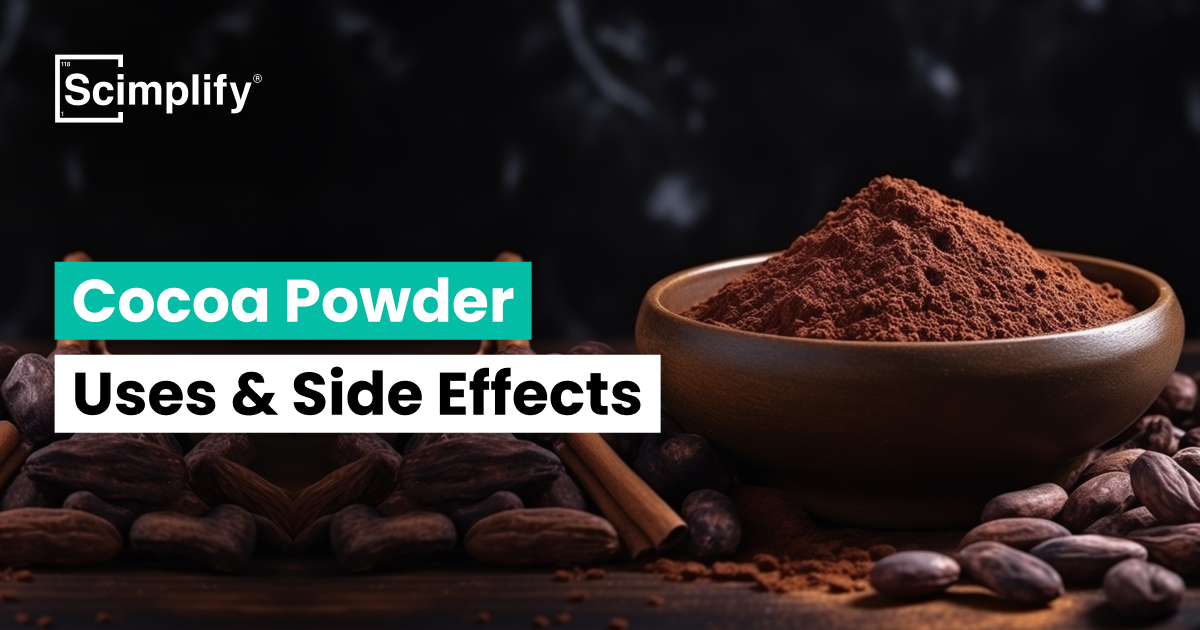Cocoa powder refers to the dry and powdered form of cocoa that has been extracted of cocoa butter (fat component) of roasted and processed cocoa beans. It is a nutrient blend with approximately 20 percent protein, 14-24 percent fat, carbohydrates, minerals ( magnesium, potassium, phosphorus, and iron ), and bioactive substances ( flavonoids and methylxanthines, theobromine, and caffeine).
It comes in two varieties: unsweetened cocoa powder (natural, acidic, and slightly bitter, dark cocoa powder) and Dutch-processed, alkalized to taste smoother and darker. Due to its taste richness and strong antioxidant profile, cocoa powder has become ubiquitous in food, beverage, nutraceutical, and confectionery production and processes across the globe.
Uses of Cocoa Powder
Cocoa powder is one of the most versatile ingredients across the global market. Some of the common uses of cocoa powder are:
1.Chocolate and Confectionery Products
- A key ingredient in chocolate bars, candies, and truffles, lending distinctive color, taste, and texture.
- Essential for compound chocolates and as a base for dark cocoa powder varieties.
2.Beverages
- Widely used in hot chocolate, chocolate shakes, flavored dairy drinks, and health beverages.
- High flavanol cocoa powder is increasingly used for functional beverages due to its antioxidant benefits.
3.Baking and Cooking
- Adds flavor to cakes, cookies, brownies, and pastries, often preferred when less fat is needed compared to cocoa butter or chocolate liquor.
- Unsweetened cocoa powder is popular for recipes requiring a rich chocolate flavor without added sugar.
4.Nutraceuticals and Supplements
- Known for its strong antioxidant profile, cocoa powder benefits include supporting cardiovascular health and reducing oxidative stress.
- Used in functional foods, protein blends, and dietary supplements.
5.Mood & Energy Support
- Natural compounds like theobromine and caffeine provide mild stimulation.
- Improves focus, alertness, and is used in supplements, energy bars, and drinks.
6.Skin & Beauty Applications
- Often incorporated in nutraceuticals and cosmetics.
- Acts as a natural cocoa butter moisturizer alternative to promote healthy skin and elasticity.
7.Weight Management
- Low-calorie unsweetened cocoa powder is a preferred choice in health-conscious diets
- Provides flavor without added sugars or excess fat.
Get a sample of premium-grade cocoa powder now!
Industries Where Cocoa Powder is Used
- Food and Nutrition
- Beverage Manufacturing
- Nutraceutical and Dietary Supplements
- Confectionery Production
- Bulk Cocoa Powder Supply for Large-Scale Processing
Cocoa Powder Side Effects
While generally safe and widely consumed, some side effects of cocoa powder may include:
1.Heavy Metal Contamination
Trace elements like cadmium may be present, requiring regulated sourcing and testing.
2.Allergic Reactions
Allergic reactions are rare, but possible in sensitive individuals.
3.Mild Stimulant Effects
Due to theobromine and caffeine, it may affect children or those intolerant to stimulants.
4.Storage Concerns
Exposure to heat, light, or moisture can degrade flavor and nutrients, requiring airtight packaging and cool storage.
Conclusion
The special composition, broad applications, and nutritional value make cocoa powder an invaluable raw material in world industries. With its bulk cocoa powder supplies to large-scale confectionery, unsweetened cocoa powder to health-centered recipes, and dark cocoa powder to premium chocolates, its versatility remains the factor that keeps the market growing.
Health-based innovations, such as high-flavonol cocoa powder, that boost functional foods and beverages, are also an added advantage to the demand. Knowledge about cocoa powder's side effects is essential for ensuring safe, regulated, and responsible consumption.
Be it food, pharmaceuticals, or nutraceuticals, cocoa powder is at the core of innovation, taste, and health.


